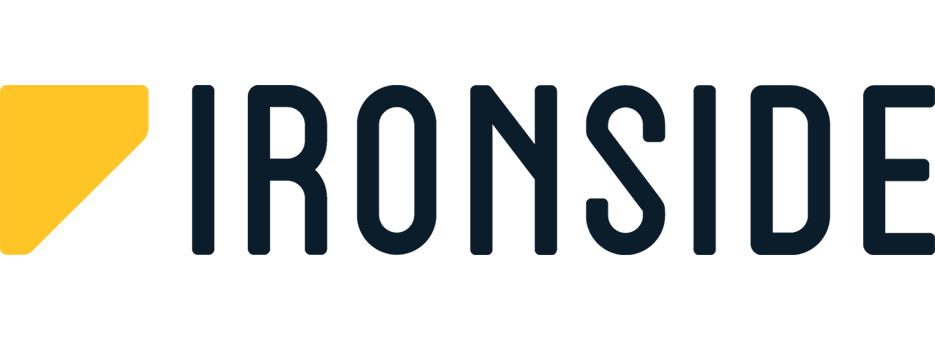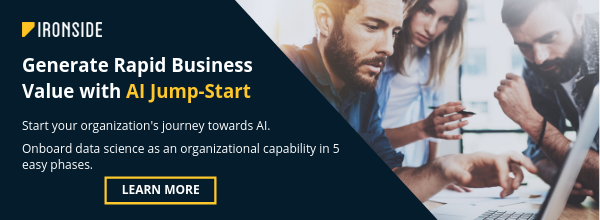From BI to Data Science: An Interview with Tom Clancy
At Ironside, we believe that data science is a team sport, and should be accessible to and enable as many players as possible. We work with clients on a regular basis to make data science accessible within their organization. But we also do this within our own company. Meet Tom Clancy – hear about his journey and what he has learned along the way.

Tom is an Associate Consultant at Ironside. He’s been with Ironside for over 2 years, since graduating with his M.S. in Business Analytics from Bentley University in 2016. Tom started at Ironside as a Technical Consultant, working on various BI projects that involved developing and creating reports, or working on data models that feed the reports. Recently however, he’s shifted from his technical BI consultant role and projects to a focus on Data Science.
I was able to briefly pull Tom away from his busy day to get insight into this career transition and ask him some questions about his experience.
Q. What or who inspired you to make a shift in your career path? Why did you choose data science?
A. I became interested in data science towards the end of my undergraduate career. I was working towards a minor in Statistics and was introduced to R in a few of my courses. This piqued my interest enough to start exploring data science further and I decided to pursue a Masters in Business Analytics, where I was exposed to the predictive side of analytics. I joined Ironside because we’re given the ability to have our hands in all things data – from IM to BI to Advanced Analytics. While I started off my Ironside career doing BI projects, I knew that there would be an opportunity to join a data science project at some point. Sure enough, that opportunity came a couple of years ago and I’ve been on the Data Science team ever since!
Q. What is one thing that you did to educate/enable yourself when you began transitioning from a BI role to a Data Science role?
A. I’ve always found that working to solve interesting, real-life use cases helps me retain learnings better than any classroom problems or online courses. So when I started to transition into the data science world, I decided to use Fantasy Football as my use case. I used Python to familiarize myself with some of the popular libraries that I thought I might use in my projects; Beautiful Soup to scrape player statistics, pandas and NumPy to manipulate the data and help create some features, and scikit-learn to try to predict how many fantasy points each player would earn in the upcoming season. All of this was pretty simple, but it was helpful to use these popular libraries and techniques to give myself a reference point to look back on when I was on actual client projects.
Q. What do you feel is the most important skill you’ve gained in this new role?
A. In my experience thus far with data science, it has been relatively easy to strengthen my technical skills through personal training and simply using different data science tools on a daily basis. The more important skills that have a steeper learning curve are the non-technical skills. I’ve learned that there is a lot more to data science than just having great analytical and technical abilities. While those are necessary and important, the qualities of the data scientists I’ve worked with that make them experts are skills like curiosity, business acumen, and critical thinking. They have the unique ability to take a step back from the problem at hand and look at it from multiple lenses. They understand the industry that they’re working with and can communicate with the client in their terms in order to gain a better understanding of the problem. And most importantly, they are curious and passionate to continue to discover new insights and improve upon their work.
Q. What is one important lesson you learned during a recent data science engagement with a client?
A. An important lesson that I learned recently was to focus on framing the right business problem first before getting bogged down in the technical details. Our data science team was working on a use case where the initial model results weren’t up to par. I thought that we were going to need to spend a lot of time engineering new features and trying different models and techniques to improve the target metric. But the issue was the way we were phrasing our question. We realized that we needed to address the problem in a different way. We took a step back and re-evaluated the problem at hand with the client before spending too much time on the technical details.
Q. What would you recommend to someone who is interested in experimenting with or learning more about data science? What are ways or resources to get started?
A. From a technical perspective, there are tons of resources available to hone your skills. Take online courses. Create your own use cases. Download others’ work off of GitHub and go through the scripts to understand the different techniques and best practices that they use. Enter Kaggle competitions and compete against yourself.
That said, what’s equally important for an aspiring data scientist is the non-technical side, since AML’s like DataRobot are starting to level the machine learning playing field. In my experience, what sets top data scientists apart from others are factors such as the ability to carry out a project from discovery to deployment and the ability to effectively communicate all aspects of data science to non-data scientists.
Thank you, Tom, for sharing your experience and insights. I look forward to seeing where your career takes you… 2019 is the year that data science, machine learning and artificial intelligence for business will become ubiquitous. If your company is ready to begin its journey towards AI right now, get started with AI Jump-Start.
About Ironside
Ironside was founded in 1999 as an enterprise data and analytics solution provider and system integrator. Our clients hire us to acquire, enrich and measure their data so they can make smarter, better decisions about their business. No matter your industry or specific business challenges, Ironside has the experience, perspective and agility to help transform your analytic environment.






